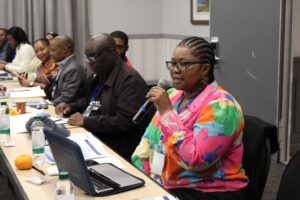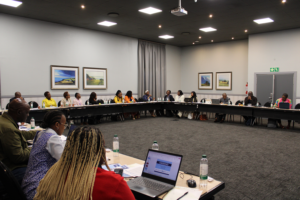
On 8 November 2023, the Kagisano Programme held a significant dialogue at the Birchwood Hotel and OR Tambo Conference Centre in Boksburg, under the theme, building socially cohesive societies: understanding social cohesion and reflecting on its fault lines.
Moderated by Nontando Zintle Ngamlana, Executive Director of Afesis, the dialogue was a collective reflection into the journey of Kagisano over its 30-month implementation across sixteen sites in six provinces and marked a pivotal moment in Kagisano’s journey towards promoting social cohesion in South Africa.
The discussion centred on understanding social cohesion in the South African context, identifying some of the challenges or fault lines preventing South Africa from promoting and building a socially cohesive nation/communities, and questioning the possibility of social cohesion in a country affected by traumatic history.
Mashoabathe Noko from the Foundation for Human Rights highlighted the need to define social cohesion in different locales because of the context of every community.
The dialogue also brought a comprehensive review of lessons learned, an assessment of youth-focused initiatives, and an analysis of the programme’s impact on community leadership and partnerships.
One critical challenge highlighted was the inability to reduce the extremist narratives increasing on social media, which threaten to undermine social cohesion efforts. This underscores the significance of strengthening advocacy and collective action in this digital age.
The youth programme was spotlighted as a vital component, recognizing the significant potential of young people as agents of change. However, the programme grapples with the realities of power dynamics fuelling violence, racial tensions, and the need for adequate resources to sustain its efforts.
“As power dynamics take place in our communities, if left unsolved, they will manifest in different ways, undermining our efforts in strengthening social cohesion”, said Ngamlana.
Responses from Dr Manthiba Phalane of the Civilian Secretariat for Police Service and Phumlani Majakajaka of the Department of Justice and Constitutional Development enriched the dialogue. The discussion highlighted the evolving nature of collective violence and the need for adaptive strategies to strengthen social cohesion.
Majakajaka noted that the transforming agenda of South Africa is clear that we need to work tirelessly to reverse past imbalances, if we were to talk about social cohesion.
The discussions delved deeper into unprocessed trauma highlighting the state’s inability to fulfil its purpose as there are very few interventions of dealing with unprocessed trauma. Foreign nationals arriving in South Africa often carry trauma from experiences like wars and oppressive governments. Meanwhile, they encounter South Africans who have their own historical trauma, stemming from the apartheid era and ongoing inequalities. When ‘trauma meets trauma’ it all leads to unresolved collective violence and vigilantism.
![]()
![]()

The dialogue emphasised the need for collaboration, a re-evaluation of social cohesion definitions based on diverse community experiences and addressing the role of community gatekeepers and leadership in fostering a cohesive society.
The lessons and strategies discussed in this dialogue will be crucial in shaping a more socially cohesive nation, resilient in the face of evolving challenges such as misinformation and disinformation.
Sizakele Shongo from the Department of Sports, Arts and Culture stated that “let us not underestimate the fact that we are going to elections next year and there are people who are already setting the fire alight with misinformation and disinformation that will have an impact in our efforts of building social cohesion”.
Ngamlana noted that, while the extremist agenda is busy consolidating to spread misinformation and disinformation, social cohesion advocates on the other hand need to capacitate and be ahead of such kind of an agenda.
The dialogue also included insights from programme representatives and case studies presented by implementing partners, Bertha Chiguvare from the Lawyers for Human Rights in Limpopo, and Stephen Shisanya from Agenda GL in KwaZulu Natal. Bertha touched on Kagisano’s work in schools across Limpopo. And Shisanya delved into bridging community divides and addressing racial tensions in KwaZulu Natal.
Shisanya noted that understanding political dynamics, and the nature of violence or tensions is key in addressing the root causes of the ongoing racial tensions.
There is a need for the media to engage more on the topic of social cohesion and for the civil society to share the information more broadly.